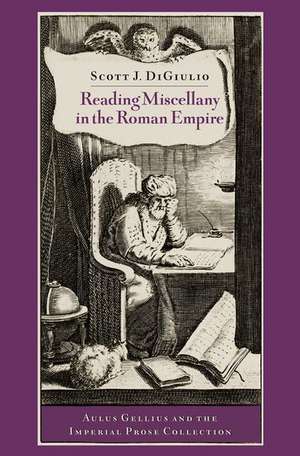Reading Miscellany in the Roman Empire: Aulus Gellius and the Imperial Prose Collection
Autor Scott J. DiGiulioen Limba Engleză Hardback – 13 ian 2025
Preț: 488.75 lei
Preț vechi: 640.44 lei
-24% Nou
Puncte Express: 733
Preț estimativ în valută:
93.53€ • 100.01$ • 77.98£
93.53€ • 100.01$ • 77.98£
Carte disponibilă
Livrare economică 17-24 martie
Preluare comenzi: 021 569.72.76
Specificații
ISBN-13: 9780197688267
ISBN-10: 0197688268
Pagini: 344
Dimensiuni: 152 x 226 x 33 mm
Greutate: 0.66 kg
Editura: Oxford University Press
Colecția OUP USA
Locul publicării:New York, United States
ISBN-10: 0197688268
Pagini: 344
Dimensiuni: 152 x 226 x 33 mm
Greutate: 0.66 kg
Editura: Oxford University Press
Colecția OUP USA
Locul publicării:New York, United States
Recenzii
Scott J. DiGiulio's book offers a rich and original interpretation of Aulus Gellius' Noctes Atticae, full of perceptive and thought-provoking close readings of this fascinating and puzzling text. He shows among other things that Gellius has an in-depth engagement with an even wider range of Latin and Greek literature than we usually assume, and that he constantly invites his readers to approach the text with reading methodologies one would usually associate with higher-status genres. DiGiulio's final chapter offers a wonderful survey of the reception of the Noctes Atticae, from late antiquity to the twentieth century, demonstrating that many of the text's later imitators have understood precisely these features of Gellius' writing.
There may be no more important work of Latin literature for understanding reading in the Roman principate, and no Roman work itself more challenging to really read, than Gellius' Noctes Atticae. But modern readers certainly could ask for no finer guide through both projects than Scott J. DiGiulio's Reading Miscellany in the Roman Empire. DiGiulio shows how a work still seen as esoteric and eccentric within the Roman canon is in fact both revealing of and a reflection on the underlying dynamics of Latin literature in this period. Through his lucid analysis we learn how miscellany was an engine of critical inquiry and innovation for ancient Romans and can be--in the hands of a talented critic--one for modern readers as well.
This is a book that needed to be written and was written at the perfect moment in the history of Gellian scholarship.... [DiGiulio] synthesises existing scholarship and offers a fresh, coherent methodology for interpreting the NA as a dynamic, pedagogical, and intertextual masterpiece.... I do not hesitate to call this work groundbreaking.
There may be no more important work of Latin literature for understanding reading in the Roman principate, and no Roman work itself more challenging to really read, than Gellius' Noctes Atticae. But modern readers certainly could ask for no finer guide through both projects than Scott J. DiGiulio's Reading Miscellany in the Roman Empire. DiGiulio shows how a work still seen as esoteric and eccentric within the Roman canon is in fact both revealing of and a reflection on the underlying dynamics of Latin literature in this period. Through his lucid analysis we learn how miscellany was an engine of critical inquiry and innovation for ancient Romans and can be--in the hands of a talented critic--one for modern readers as well.
This is a book that needed to be written and was written at the perfect moment in the history of Gellian scholarship.... [DiGiulio] synthesises existing scholarship and offers a fresh, coherent methodology for interpreting the NA as a dynamic, pedagogical, and intertextual masterpiece.... I do not hesitate to call this work groundbreaking.
Notă biografică
Scott DiGiulio is Associate Professor of Classics and Senior Research Associate of the Cobb Institute of Archaeology at Mississippi State University. He is the co-editor of Documentality: New Approaches to Documents in the Roman Empire.
